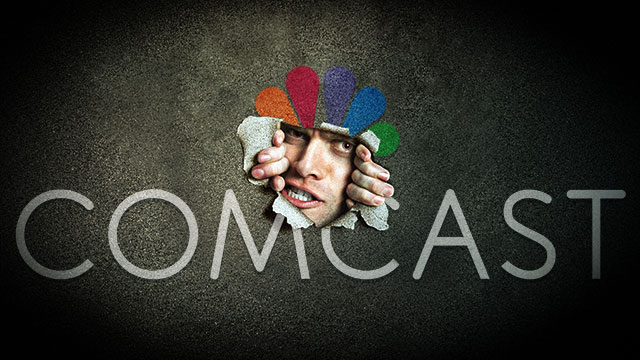
Comcast’s customer satisfaction score for subscription TV service fell 6 percent in a new survey, putting the company near the bottom of rankings published by the American Customer Satisfaction Index (ACSI).
Comcast’s score fell from 62 to 58 on ACSI’s 100-point scale, a drop of more than 6 percent between 2016 and 2017. The ACSI’s 2017 report on telecommunications released this week attributed the decrease to “price hikes for Xfinity (Comcast) subscriptions.”
Satisfaction with pay-TV providers dropped industry-wide, tying the segment with Internet service (a product offered by the same companies) for last place in the ACSI’s rankings. The ACSI summarized the trend as follows:
Customer satisfaction with subscription television service slips 1.5 percent to 64, tied with Internet service providers for last place among 43 industries tracked by the ACSI. Many of the same large companies offer service for Internet, television, and voice via bundling. The threat of competition from streaming services has done little to spur improvement for pay TV. Customer service remains poor, and cord-cutting continues to accelerate. More than half a million subscribers defected from cable and satellite TV providers during the first quarter of 2017—the largest loss in the history of the industry.
Customers still prefer fiber optic and satellite to cable, putting FiOS (Verizon Communications) in first place with a 1 percent uptick to 71. AT&T takes the next two spots with its fiber optic and satellite services.
The ACSI tracks more than 300 companies, interviewing 180,000 customers each year. The average score is 76.8, about 20 percent higher than the TV and home Internet industries. Click here for a list of all industries that rank better than cable TV and Internet providers.
Comcast has blamed price increases on things it doesn’t control, namely the amount it must pay for programming. But no other company in the survey saw as big a decline in customer satisfaction with pay-TV, and most of the major ones were able to increase their scores. Verizon and AT&T put up the highest scores, while Comcast was second to last, ahead of Mediacom.
These charts show satisfaction scores for individual companies and for industry-wide benchmarks such as picture quality and the ease of understanding bills (ACSI notes that "very few elements of the customer experience have improved"):
Comcast is facing a lawsuit from customers over rising “Broadcast TV” and “Regional Sports” fees that Comcast says it uses to recover the costs of programming. These fees push the actual prices customers pay above the advertised rates. Comcast is the largest cable and broadband company in the US.
Comcast rises in broadband while TWC drops
By contrast, Comcast’s score improved on the broadband side of its business, rising from 59 to 60, ranking 8th out of 11 services that were big enough to have their scores broken out in the rankings:
“Customer service aside, subscribers like fast Internet access, and Comcast has increased Internet speed 16 times over the past 14 years,” the ACSI report said. Comcast has also been trying to improve customer service for years after facing extensive criticism from subscribers and US lawmakers.
Many US customers are still stuck with slower speeds and no option to switch to higher-speed providers.
"Data-rich video accounts for more than half of all Internet traffic, but ISPs are falling short of providing higher-capacity networks at an affordable price," the ACSI said. "Competition is limited across most of the country, and customers are unhappy to be locked into service contracts when prices rise. Service is still largely considered to be slow and unreliable."
Charter, the second biggest cable company, provides an interesting case because the ACSI is tracking the pre-merger “Spectrum” service separately from the former Time Warner Cable (TWC) territory that Charter acquired in May 2016.
Charter was able to raise its TV satisfaction scores for both Spectrum and Time Warner Cable, and it raised Spectrum’s Internet satisfaction score. But TWC customers have gotten less satisfied with Internet service: the TWC score dropped from 66 to 62, putting it ahead of Comcast but behind most other major Internet service providers.
We’ve contacted both Comcast and Charter about their scores and will update this story if we get responses.
Charter is also facing a lawsuit over broadcast TV and sports fees. Former TWC video subscribers have been leaving the company in significant numbers after being hit with price increases.
On the Internet side, Charter is facing a lawsuit from New York Attorney General Eric Schneiderman, who accuses the TWC subsidiary of “conducting a deliberate scheme to defraud and mislead New Yorkers by promising Internet service that they knew they could not deliver.”
Charter has promised network improvements, but speed increases planned by TWC before the merger have reportedly been slow in coming.
Mobile customers benefit from competition
Mobile carriers performed much better than cable TV and home broadband companies. Industry-wide, wireless phone satisfaction scores rose from 71 to 73 from 2016 to 2017, with TracFone Wireless leading the way at 77. Verizon Wireless led the four major carriers, with an increase from 71 to 74. Sprint rose from 70 to 73, T-Mobile USA dropped from 74 to 73, and AT&T improved from 71 to 72.
"Customer satisfaction with wireless telephone service climbs 2.8 percent to 73, as carriers engage in increasingly competitive price wars," the ACSI said. "Compared with other telecom categories where customers have little choice, the wireless industry is a good example of how competition impacts customer satisfaction. When companies fight for customers, prices are competitive, service improves, and customer satisfaction is higher."
Disclosure: The Advance/Newhouse Partnership, which owns about 13 percent of Charter, is part of Advance Publications. Advance Publications owns Condé Nast, which owns Ars Technica.
reader comments
106